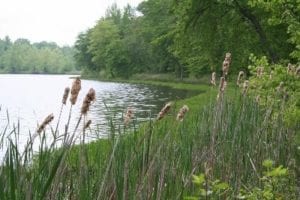The Water Research Commission (WRC) received special recognition for funding and publication of the Wet‐Management Series, at the Annual National Wetland Awards, sponsored by Mondi. This prestigious event recognised outstanding contributions and achievements of those doing wetland work and successfully showcased innovation to the wetland sector and the public.
Bonani Madikizela, a WRC research manager, received the award with pride from the Deputy Minister of Water and Environmental Affairs, Rejoice Mabudafhasi. Amongst the other award recipients were Craig Cowden from Ground Truth, KwaZulu-Natal (KZN), and Doug Woods, a farmer from Kokstad, KZN, who were recognised for their ‘Wetland Stewardship’ and successful wetland rehabilitation projects. Dr Heather Malan from the Freshwater Research Centre received an award for ‘Wetland Science and Research’ in recognition of a range of wetland research projects and related scientific publications. The WET-Management Series is a set of integrated tools specifically developed for assisting users to achieve well-informed and effective wetland management and rehabilitation. It is the product of the Wetland Rehabilitation component of the National Wetlands Research Programme, an initiative of the WRC. This component was jointly funded by the WRC and the former Department of Environmental Affairs and Tourism, through the South African National Biodiversity Institute (SANBI). Other key partners included the Department of Water Affairs, Mondi Wetlands Project, provincial conservation agencies, universities and private enterprise. “Wetlands are fascinating and dynamic ecosystems that provide indispensable ecosystem services. Commonly referred to as marshes, swamps, bogs or vleis, they constitute about 2.4% of South Africa’s surface area”, says Madikizela. “They support a range of specialised plant, insect, bird and mammal life and also supply wild food, grazing, building and craft materials to people. Wetlands play a key role in absorbing flood waters, improving water quality and regulating stream flow, helping to maintain ecosystem functioning downstream”. In many parts of South Africa wetlands are important sites for small-scale subsistence agriculture. Many culturally and economically important species are found in wetlands, including wild food, craft and medicinal plants that are important for rural communities. Wetlands are a source and basis of economic development, and support livelihoods in every aspect; without them there is no water, there is no life.According to Madikizela, the challenges of wetland management and rehabilitation span a range of spatial scales and institutional levels, from the national and provincial to the level of specific wetland sites involving individual landowners. Whereas national policy and legislation provide clear direction and support for rehabilitation, the very complex links between people and wetlands mean that actions aimed at sustainably rehabilitating and conserving wetlands will depend on the dedication and commitment of all stakeholders, especially landowners and wetland users.
When planning rehabilitation, it is therefore necessary to consult openly and comprehensively, and to incorporate the contributions of landowners, land users and other key stakeholders such as municipal bodies or provincial departments who will also benefit from the rehabilitation. Care must be taken to address both the causes and symptoms of wetland degradation. Clear measurable objectives are required and rehabilitation plans need to be developed with a multidisciplinary team that includes expertise in both ecological functioning and the design of rehabilitation structures. Wetland loss in South Africa is significant. As wetlands are transitional between aquatic and terrestrial (water and land) ecosystems, they are vulnerable to impacts on both. In addition to direct impacts, such as draining for pastures and crops, or the construction of infrastructure such as roads that impede and concentrate water flows, there are also severe on-going impacts from pollution and erosion in catchments as well as from excessive water abstraction, loss of vegetation cover, climate change and land use change. Dr Stanley Liphadzi, WRC executive manager says, “Many of South Africa’s wetlands are already lost because of agriculture, timber plantations, mining and urban development. Studies in several major catchments have revealed that between 35% and 60% of our wetlands, and the benefits they provide, have been lost or severely degraded. But degradation is not necessarily permanent, and international and South African experience has shown that it is possible to recover some of the health and values of degraded wetlands through rehabilitation.” Wetland rehabilitation as a means of addressing past degradation forms part of an effective wetland conservation strategy, as does protection and wise use. In South Africa, wetland conservation is being increasingly addressed through a range of policy and legislative frameworks, particularly within the environment and water sectors. Furthermore, several multilateral agreements which South Africa is party to have incorporated the two-pronged approach to maintaining healthy wetlands while rehabilitating degraded ones.






